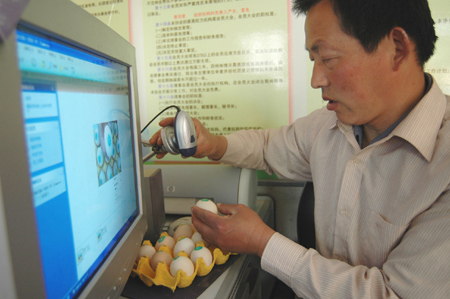Economy
Rural communities sow seeds of cyber business success
By Chen Limin (China Daily)
Updated: 2011-03-21 14:30
 |
Large Medium Small |
|
 |
|
A farmer puts online information about eggs for sale from his chicken farm in Shandong province including the fact they contain additives such as iodine, vitamins B and D. E-commerce as a means to sell farmers' products is getting popular among rural families across the countryside. [Photo / China Daily] |
But peer through a few windows in this small community of some 60,000 people living in 17 villages in northern Jiangsu province and it soon becomes clear something far more modern and innovative lies behind a growing affluence.
The driving force behind steadily rising incomes for which the area in East China has become widely known is a relatively new manifestation of businessmen in rural China - "netpreneurs" - people who use the Internet to make money.
The phenomenon has seen the number of resident online sellers rise from just a few five years ago to more than 1,000 at present.
Few locals knew about the Internet when Sun Han, the first man in Shaji to open an online store on Taobao.com, China's eBay, went into cyberbusiness in 2006. However, as orders grew, an increasing number of fellow villagers started to follow in the pioneer's footprints and try their hand at selling, using clicks rather than bricks as the foundation of their business.
"Several people who learned from me do even better than me now," said Sun, who quit his job at a local branch of telecom carrier China Mobile to start his own company.
He began by selling small household ornaments, which earned him a profit of about 2,000 yuan ($304) a month. However, a trip to Swedish self-assembly home furnishing store IKEA prompted him to make some changes to his business model.
"Wooden furniture has a big market, and if we can make it in the village, there will be a considerable profit," he said.
Sun started looking for carpenters to work on a trial basis. His first month earnings were slightly more than what they had been, but as he began to pay more attention to marketing, the business began to steadily improve. After a year, he invested 100,000 yuan to set up a furniture workshop to meet rising demand for his goods.
Now, every day, express delivery trucks stop outside his home to load furniture. Villagers more used to living off the land watched fascinated - and then began to develop their own online ventures.
Pan Xinfu, an entrepreneur in his 20s, is one of the many trying to copy Sun's success in the nearby city of Suqian.
"We are all excited about doing business just by sitting at home and using the Internet," he said. "It's better than leaving home and working in the city."
There are now more than 300 online stores established by people from Suqian on Taobao, one third of which sell wooden furniture.
A similar cluster then formed around Shaji, retailing diverse products ranging from wood and metal goods, recycling paper cartons and offering logistics solutions and even online business services.
In Shaji town alone, there are 180 furniture factories and 16 logistics companies, according to official figures. Online sales in the town hit 100 million yuan in 2009, and surged to 300 million yuan last year.
Now the business has grown big, people including Sun Han are thinking how to grow it well.
"We have hired our own designer," said Sun, who has started to move on from copying ready-made products sold at IKEA to designing his own.
Last year, he invested another 1 million yuan to build a new factory, which produces different styles of furniture. On a good day, his online store can earn 30,000 yuan.
Designing original furniture is just one of the challenges now befalling him. He and fellow netpreneurs have to develop the sustainable growth of their businesses.
Low-level duplication of one another, vicious price competition and the lack of intellectual property rights are major challenges among Shaiji's wooden-furniture providers, according to research conducted by the Center for Informatization Study, part of the Chinese Academy of Social Sciences.
| ||||
He added that the Shaji experience could be applied to other rural areas in China.
"In many rural areas, e-commerce as a means to sell farmers' products to the market is based on already-existing businesses in the area. Compared with this, Shaji is less reliant on others."
In Donggaozhuang, a village in Hebei province, more than 300 families, out of a total of 400, sell cashmere yarn online, it being an important center for processing the natural material. Some 20 sellers have annual revenues each of more than 1 million yuan; the largest enjoys 10 million yuan a year.
| 分享按钮 |


